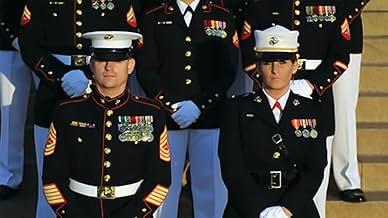IMDb रेटिंग
7.6/10
7.4 हज़ार
आपकी रेटिंग
अपनी भाषा में प्लॉट जोड़ेंAn investigative documentary about the epidemic of rape of soldiers within the US military.An investigative documentary about the epidemic of rape of soldiers within the US military.An investigative documentary about the epidemic of rape of soldiers within the US military.
- 1 ऑस्कर के लिए नामांकित
- 11 जीत और कुल 14 नामांकन
Ariana Klay
- Self - US Marine Corps
- (as Lieutenant Ariana Klay)
Elle Helmer
- Self - US Marine Corps
- (as Lieutenant Elle Helmer)
Debra Dickerson
- Self - US Air Force
- (as Ret. Captain Debra Dickerson)
फ़ीचर्ड समीक्षाएं
I am writing this review two days before Veteran's Day on purpose, not out of sheer, fortunate coincidence. When president Dwight Eisenhower declared November 11th a day of remembrance and observation for current war veterans and those who have died in combat, I highly doubt he knew that one day, there would be surrounding controversy that female members of the military were facing rape and sexual assault cases, and little was being done to punish those involved. Speaking as someone who loves the country he's been fortunate to be born into and someone who continuously supports, gives credit to, and thanks veterans for their service, this is an appalling and sickening feat that almost taints the entire military system as a whole.
Kirby Dick's The Invisible War is a film that will have an unprecedented impact on many of its viewers. Some of its viewers, hopefully young women contemplating serving in a specific branch, may second-guess their decision to join. Statistics show that 20% of women in the military have been raped, the second they are part of the military, their chances of rape increases by two, and the most terrifying statistic of all; 15% of recruits entering the military have raped someone before.
We meet several women raped under many different circumstances, who have served in the U.S. Coast Guard, the Navy, and even the Marines, yet can not escape the frighteningly real numbers. The main woman we follow throughout the film is Kori Cioca, a young member U.S. Coast Guard, who was brutally raped shortly after joining the military branch, and during the rape, she was slapped so hard on the left side of her face that it dislocated plates in her jaw, resulting in her only consuming soft foods and bearing only warm weather. Her struggle, now, is number one, receiving compensation and money from the VA, which is turning their back on her because her deployment was too brief to qualify for money or treatment, and number two, trusting males again (when we see her with her loving and devoted husband we see how nervous, unsettled, and provoked she feels with him in the room).
Aside from hearing cases and a number of devastating rape stories from women, Dick interviews lawyers who have worked on military rape cases and talks to a number of authors on the subject. One even states how that the punishment for rape is so lenient and miniscule that a person who has done drugs and is caught can be suspended for years, but a person who has raped another individual can be suspended for just a few weeks.
And if you believe this is a problem reserved for women then think again; 10% of men in the military are raped and we aren't deprived of hearing their shocking stories as well. One man who was a victim to the heinous crime states that it's a byproduct of the military's almost inherent homophobia, the outdated feeling of "the macho man," and the idea of power through narcissism. When will we, as a nation, overcome those three depressing qualities? It's hard to call The Invisible War "enjoyable" in the usual documentary-sense. It's one of the most impacting films of the year, and should be required classroom viewing at that. Director Kirby Dick is known for exploring institutions that are surrounded by grayness, such as the Catholic Church in Twist of Faith and the biased, inconsistent MPAA in This Film is Not Yet Rated. Unlike in those films, Dick remains silent, letting the larger stories speak first and him not giving his usual goofy spin on things. Considering how highly we praise and cherish our military, having this film come out, exposing the misogyny and disrespect to women in the male-dominated military, is a kick to the groin. Or possible a Miss Representation. As a viewer, you can decide.
Directed by: Kirby Dick.
Kirby Dick's The Invisible War is a film that will have an unprecedented impact on many of its viewers. Some of its viewers, hopefully young women contemplating serving in a specific branch, may second-guess their decision to join. Statistics show that 20% of women in the military have been raped, the second they are part of the military, their chances of rape increases by two, and the most terrifying statistic of all; 15% of recruits entering the military have raped someone before.
We meet several women raped under many different circumstances, who have served in the U.S. Coast Guard, the Navy, and even the Marines, yet can not escape the frighteningly real numbers. The main woman we follow throughout the film is Kori Cioca, a young member U.S. Coast Guard, who was brutally raped shortly after joining the military branch, and during the rape, she was slapped so hard on the left side of her face that it dislocated plates in her jaw, resulting in her only consuming soft foods and bearing only warm weather. Her struggle, now, is number one, receiving compensation and money from the VA, which is turning their back on her because her deployment was too brief to qualify for money or treatment, and number two, trusting males again (when we see her with her loving and devoted husband we see how nervous, unsettled, and provoked she feels with him in the room).
Aside from hearing cases and a number of devastating rape stories from women, Dick interviews lawyers who have worked on military rape cases and talks to a number of authors on the subject. One even states how that the punishment for rape is so lenient and miniscule that a person who has done drugs and is caught can be suspended for years, but a person who has raped another individual can be suspended for just a few weeks.
And if you believe this is a problem reserved for women then think again; 10% of men in the military are raped and we aren't deprived of hearing their shocking stories as well. One man who was a victim to the heinous crime states that it's a byproduct of the military's almost inherent homophobia, the outdated feeling of "the macho man," and the idea of power through narcissism. When will we, as a nation, overcome those three depressing qualities? It's hard to call The Invisible War "enjoyable" in the usual documentary-sense. It's one of the most impacting films of the year, and should be required classroom viewing at that. Director Kirby Dick is known for exploring institutions that are surrounded by grayness, such as the Catholic Church in Twist of Faith and the biased, inconsistent MPAA in This Film is Not Yet Rated. Unlike in those films, Dick remains silent, letting the larger stories speak first and him not giving his usual goofy spin on things. Considering how highly we praise and cherish our military, having this film come out, exposing the misogyny and disrespect to women in the male-dominated military, is a kick to the groin. Or possible a Miss Representation. As a viewer, you can decide.
Directed by: Kirby Dick.
What I saw on this Doc is a National Disgrace, and I can imagine what women and certain men also endure in foreign occupations.
So girls...as I see it, the only way you're going to have a career in the military is to be tall, muscular, have a black belt in martial arts, carry a concealed knife or other blunt object and not be afraid to smash a chair over a drunk's head or crash your booted foot across his face. No make-up or revealing clothes...please.
Never, ever drink in a military man's presence and if forced to then carry a secret empty container in your pocket in which to pour your shots and then off to the toilet.
The military is no dream job and unless you can face the truth stay in a civilian home girl's job. You were accepted into the military because it needs meat to throw to the hungry predators. Wake up and get some street smarts and so sorry. Keep on fighting for your rights, but accept the truth about humans because they are capable of ANYTHING.
So girls...as I see it, the only way you're going to have a career in the military is to be tall, muscular, have a black belt in martial arts, carry a concealed knife or other blunt object and not be afraid to smash a chair over a drunk's head or crash your booted foot across his face. No make-up or revealing clothes...please.
Never, ever drink in a military man's presence and if forced to then carry a secret empty container in your pocket in which to pour your shots and then off to the toilet.
The military is no dream job and unless you can face the truth stay in a civilian home girl's job. You were accepted into the military because it needs meat to throw to the hungry predators. Wake up and get some street smarts and so sorry. Keep on fighting for your rights, but accept the truth about humans because they are capable of ANYTHING.
There are a number of things Invisible War does well.
1. It conveys a point of view.
2. It's about a compelling subject.
3. It has sympathetic characters.
4. It has a narrative arc, which is challenging. It relies on the lawsuit and Cioca's disability claim.
5. The cinematography, audio and film making don't draw attention to themselves and distract from the subject.
I was quoted in a book about sexual assault in the military. In that book the author made the assumption there was some golden age before sexual assault was a problem in the military, a claim she offered no proof of.
I mention this because it's possible to tell the story of rape and sexual assault in the military and get it wrong.
This film uses a pretty hard-and-straight approach. It sticks to cases that are pretty well documented to illustrate the statistical picture create by the military's own data.
And the film has a couple villains to root against. The Air Force major general and her civilian predecessor come off as part clueless and part immoral.
1. It conveys a point of view.
2. It's about a compelling subject.
3. It has sympathetic characters.
4. It has a narrative arc, which is challenging. It relies on the lawsuit and Cioca's disability claim.
5. The cinematography, audio and film making don't draw attention to themselves and distract from the subject.
I was quoted in a book about sexual assault in the military. In that book the author made the assumption there was some golden age before sexual assault was a problem in the military, a claim she offered no proof of.
I mention this because it's possible to tell the story of rape and sexual assault in the military and get it wrong.
This film uses a pretty hard-and-straight approach. It sticks to cases that are pretty well documented to illustrate the statistical picture create by the military's own data.
And the film has a couple villains to root against. The Air Force major general and her civilian predecessor come off as part clueless and part immoral.
Kirby Dick's The Invisible War is an unsettling and scathing examination of sexual assault within branches of the US military (the Army, Marines, Air Force, etc.) that dives into its topics with various levels of emotional involvement. The interviews of the victims are raw, unfiltered, and unflinching, and are, indeed, very tragic. To also see the corruption and lengths to cover up and distract from the truth – such as unintentionally hilarious commercials advising about assault in the army – is practically infuriating. Kirby Dick makes for a strong interviewer, nailing his topics, letting the victims speak their mind, and leaving the guilty parties shaking in their boots, trying and failing miserably to lie through their teeth. Emotions will be put to a workout.
****1/2 out of *****
****1/2 out of *****
Rape in the military is about as thorny and intractable a problem as deciding whether to go to mid-east war or not. The Invisible War solidly makes the argument that the military judicial process for rape is deeply flawed, if only because commanders are given the absolute right and power to determine how the accusations are handled.
Think about it: the commander could be the assailant or a friend and can dismiss a case with little recourse for the aggrieved soldier. This documentary hammers home both statistically and in practice how frustrating the process can be, sometimes leading to suicide. A recent court decision that rape is an "occupational hazard" doesn't help anything.
At the least, husbands and wives become tense or split; rarely is a marriage unaffected by the rape. For singles, the sympathy is not overwhelming, and without a support group, it is lonely out there to take on the chain of command. In a macho world where team attitude is high priority, rape allegations are not welcomed, especially if the rapist is the commanding officer.
As I find in many documentaries, only one side is examined (Michael Moore being the leading exponent of the lopsided argument). In the case of The Invisible War, we are well served with victims who get no satisfaction, but we don't experience fully the case where the accused is found to have been wronged by the accuser. However, the doc does an effective job with the stories of women who accused but rarely gained a conviction.
The percentage of adjudicated cases where the accused is found guilty is small. Given the thousands of allegations, that number seems too small. At any rate, after seeing this documentary, Secretary of Defense made a bold decision that confirms the efficacy of a well-made documentary.
Think about it: the commander could be the assailant or a friend and can dismiss a case with little recourse for the aggrieved soldier. This documentary hammers home both statistically and in practice how frustrating the process can be, sometimes leading to suicide. A recent court decision that rape is an "occupational hazard" doesn't help anything.
At the least, husbands and wives become tense or split; rarely is a marriage unaffected by the rape. For singles, the sympathy is not overwhelming, and without a support group, it is lonely out there to take on the chain of command. In a macho world where team attitude is high priority, rape allegations are not welcomed, especially if the rapist is the commanding officer.
As I find in many documentaries, only one side is examined (Michael Moore being the leading exponent of the lopsided argument). In the case of The Invisible War, we are well served with victims who get no satisfaction, but we don't experience fully the case where the accused is found to have been wronged by the accuser. However, the doc does an effective job with the stories of women who accused but rarely gained a conviction.
The percentage of adjudicated cases where the accused is found guilty is small. Given the thousands of allegations, that number seems too small. At any rate, after seeing this documentary, Secretary of Defense made a bold decision that confirms the efficacy of a well-made documentary.
क्या आपको पता है
- ट्रिवियाA rare example of a film actually influencing government/military policy, end credits state that "On April 14.2012, Secretary of Defense Leon Panetta, watched this film. Two days later, he took the decision to prosecute away from unit commanders." However, it was noted that "this is not enough." The preceding is a true statement, but can be misleading. Military Commanders still hold prosecutorial discretion, but they can no longer be in the unit where the alleged misconduct had taken place. An "outside, higher ranking colonel" would now hold prosecutorial discretion.
- भाव
Kori Cioca - US Coast Guard: Thank you for your sacrifice, in whatever shape it may come with serving. God Bless.
- कनेक्शनEdited into Independent Lens: The Invisible War (2013)
- साउंडट्रैकNeed Someone
Performed by Mary J. Blige
Courtesy of Geffen Records under license from Universal Music Enterprises
टॉप पसंद
रेटिंग देने के लिए साइन-इन करें और वैयक्तिकृत सुझावों के लिए वॉचलिस्ट करें
- How long is The Invisible War?Alexa द्वारा संचालित
विवरण
बॉक्स ऑफ़िस
- US और कनाडा में सकल
- $71,968
- US और कनाडा में पहले सप्ताह में कुल कमाई
- $16,500
- 24 जून 2012
- दुनिया भर में सकल
- $71,968
- चलने की अवधि1 घंटा 33 मिनट
- रंग
- पक्ष अनुपात
- 1.78 : 1
इस पेज में योगदान दें
किसी बदलाव का सुझाव दें या अनुपलब्ध कॉन्टेंट जोड़ें




























